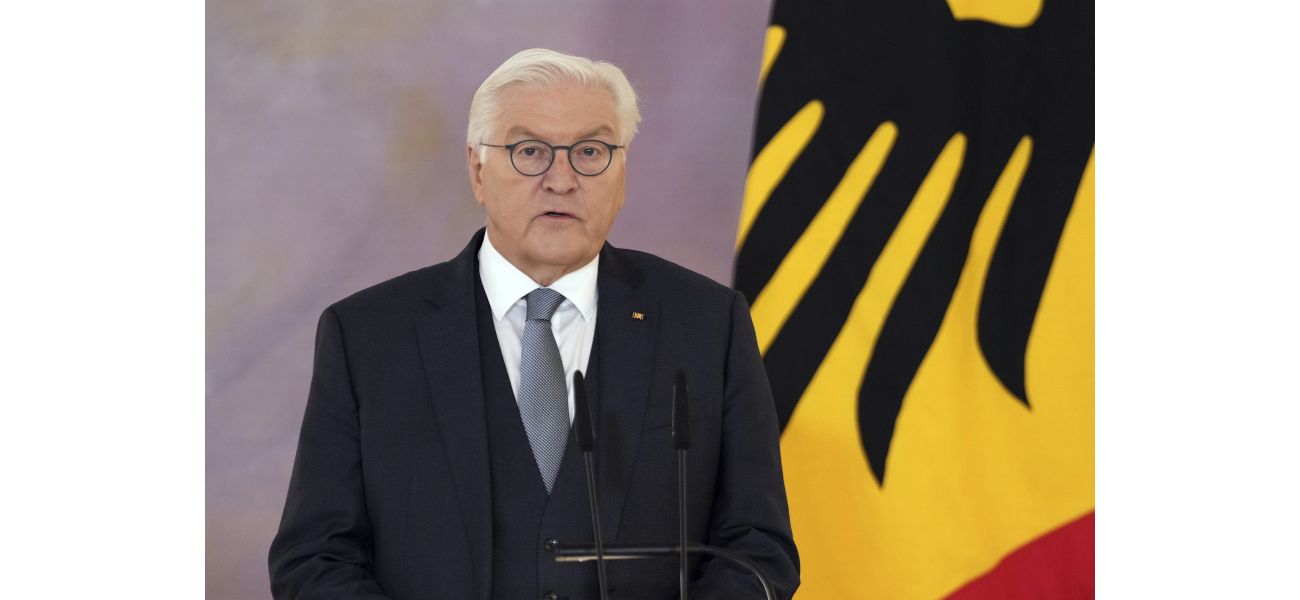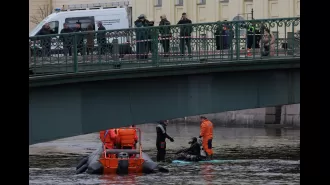German president dissolves parliament and schedules new election for upcoming year.
German President dissolved parliament and scheduled elections for February 23 following collapse of Chancellor Olaf Scholz's coalition.
December 27th 2024.

On Friday, German President Frank-Walter Steinmeier made the decision to dissolve parliament and call for new elections on February 23. This came after the collapse of Chancellor Olaf Scholz's coalition, which lost a confidence vote on December 16. Scholz now leads a minority government after his coalition fell apart on November 6 due to a disagreement over how to revive Germany's stagnant economy.
Steinmeier explained that he arrived at this decision after consulting with party leaders and realizing that there was no agreement among Germany's political parties on a majority for a new government in the current parliament. He emphasized the importance of having a stable government that is able to take action and has a reliable majority in parliament, especially during difficult times.
According to the post-World War II constitution, the responsibility of dissolving parliament falls on the president as the Bundestag cannot do so itself. Steinmeier had 21 days to make this decision and once parliament is dissolved, the election must be held within 60 days. After discussions with leaders of major parties, the date for the election was set for February 23, seven months earlier than originally planned.
Steinmeier also expressed concern about outside interference in the upcoming election, citing recent instances in other countries. He warned that such interference is a danger to democracy, whether it is covert or open and blatant, as is currently being practiced on a certain platform.
The campaign for the election is already in full swing, with polls showing Scholz's party trailing the conservative Union bloc led by Friedrich Merz. Vice Chancellor Robert Habeck of the environmentalist Greens, the remaining partner in Scholz's government, is also in the running for the top job, although his party is currently behind in polls. If current polls hold up, the likely next government would be led by Merz in coalition with at least one other party.
Key issues in the election include immigration, reviving the economy, and supporting Ukraine in its conflict with Russia. The far-right Alternative for Germany (AfD) party, which is polling strongly, has nominated Alice Weidel as its candidate for chancellor, but other parties have ruled out working with them.
Germany's electoral system traditionally leads to coalitions as no party is able to win an absolute majority on its own. As a result, the election is expected to be followed by weeks of negotiations to form a new government. This is only the fourth time in Germany's post-World War II history that the Bundestag has been dissolved ahead of schedule, with the previous instances occurring in 1972, 1982, and 2005.
The 9NEWS app is available for download on the Apple App Store and Google Play, providing the latest updates on breaking news, sports, politics, and weather. Users can also receive notifications straight to their smartphones.
Steinmeier explained that he arrived at this decision after consulting with party leaders and realizing that there was no agreement among Germany's political parties on a majority for a new government in the current parliament. He emphasized the importance of having a stable government that is able to take action and has a reliable majority in parliament, especially during difficult times.
According to the post-World War II constitution, the responsibility of dissolving parliament falls on the president as the Bundestag cannot do so itself. Steinmeier had 21 days to make this decision and once parliament is dissolved, the election must be held within 60 days. After discussions with leaders of major parties, the date for the election was set for February 23, seven months earlier than originally planned.
Steinmeier also expressed concern about outside interference in the upcoming election, citing recent instances in other countries. He warned that such interference is a danger to democracy, whether it is covert or open and blatant, as is currently being practiced on a certain platform.
The campaign for the election is already in full swing, with polls showing Scholz's party trailing the conservative Union bloc led by Friedrich Merz. Vice Chancellor Robert Habeck of the environmentalist Greens, the remaining partner in Scholz's government, is also in the running for the top job, although his party is currently behind in polls. If current polls hold up, the likely next government would be led by Merz in coalition with at least one other party.
Key issues in the election include immigration, reviving the economy, and supporting Ukraine in its conflict with Russia. The far-right Alternative for Germany (AfD) party, which is polling strongly, has nominated Alice Weidel as its candidate for chancellor, but other parties have ruled out working with them.
Germany's electoral system traditionally leads to coalitions as no party is able to win an absolute majority on its own. As a result, the election is expected to be followed by weeks of negotiations to form a new government. This is only the fourth time in Germany's post-World War II history that the Bundestag has been dissolved ahead of schedule, with the previous instances occurring in 1972, 1982, and 2005.
The 9NEWS app is available for download on the Apple App Store and Google Play, providing the latest updates on breaking news, sports, politics, and weather. Users can also receive notifications straight to their smartphones.
[This article has been trending online recently and has been generated with AI. Your feed is customized.]
[Generative AI is experimental.]
0
0
Submit Comment





